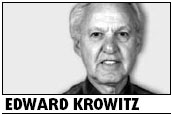China's reserves: Golden dragon or sitting duck
By EDWARD KROWITZ (China Daily)Updated: 2007-06-07 07:20
 Like good food, good sex or money, can one ever have too much of a good
thing?
Like good food, good sex or money, can one ever have too much of a good
thing?
With their wishy washy "on the one hand but then on the other " attitude, one would normally avoid asking economists - except when discussing the Chinese economy.
Here's what the May 2007 World Bank update has to say about Chinese economic performance: Growth prospects are good; GDP is expected to rise by 10.4 percent this year; the stock market is booming, export growth is surging, the trade surplus is continuing and foreign exchange reserves are soaring. What's not to like in this picture?
With over a trillion dollars sitting in its exchange reserves, earning the going rate of 3 to 4 percent for US treasury bonds, barely maintaining its value in real terms, is China in danger of putting all its eggs in one very fragile basket?
Recent research by Morris Goldstein of the Institute of International Economics demonstrated that despite announced changes in a revised basket of currencies the Chinese currency remains pegged to the US dollar. Why should this be worrisome?
In two words: portfolio diversification. The safety of one's savings, even for a nation, should be the paramount consideration in guiding investment strategy. But with the US current account deficit approaching 7 percent of GDP, the largest ever recorded by any country, questions arise whether this is sustainable.
The flip side of this is foreign purchases of a growing share of US financial assets, now reaching 30 percent of GDP. With any action to correct its imbalances unlikely until after the 2008 US presidential elections, will America's creditors experience a Woody Woodpecker moment?
Economist Paul Krugman uses the analogy to Road Runner cartoons to demonstrate a sharp, unexpected turnaround in investor behavior.
In these cartoons, Woody is chased by his nemesis, Wilie E. Coyote, who, during the chase, unknowingly runs off a desert cliff but continues running, this time over thin air. Nothing happens until Wilie looks down, realizes nothing is holding him up, and suddenly plunges to the desert floor below.
Krugman asks if such a scenario is possible with foreign purchases of US assets which sustain a continuation of the US trade deficit.
Could the value of the US currency suddenly plunge after foreigners realize that the increasing share of US securities in foreign hands is unsustainable? They could start to unload their holdings of dollar-denominated assets, precipitously driving down the dollar exchange rate.
To bring the US current account into balance, it is estimated that a depreciation of the US dollar anywhere from 30 to 40 percent is needed in real terms, equivalent to a loss for China of almost one year's worth of foreign exchange earnings.
The 2007 increase in China's reserves is estimated at $320 million. One source has called the amount held in reserves an enormous waste of resources that is not being put to use in alternative investments with higher returns, such as domestic spending on health care, pensions and education.
The plausibility of the plunge scenario taking place is the continuation in the unprecedented size of the US trade deficit, the largest in the world.
Deficits have risen by an annual average of $100 billion over the last four years, though moderating somewhat to 6 percent of GDP in the first quarter of this year. This deficit is financed by surplus countries, mainly in East Asia and the euro area, investing their dollars in US financial assets, mainly treasury bonds.
The question that comes to mind is how much longer will foreign investors continue this strategy before they too have a Wilie E. Coyote moment, suddenly realizing the dollar's value doesn't make sense and unload their holdings? At this moment, would China continue to place some $200 to $300 billion a year in an asset that might suddenly lose its value?
Some commentators, such as John Lipsky and Miranda Xafa of the IMF, take a contrary view.
They essentially agree with Charles de Gaulle on the alleged ability of the US to force the world to accept dollars and a low return on dollar-denominated securities because of the dollar's key currency status, a strong tradition of protecting private property, and its place as a safe haven in a stormy world.
This contrarian view maintains that, by correct measurement, foreigners don't own that much of the US economy, markets essentially have it right, and countries will continue to underwrite the US trade deficits indefinitely by continuing to purchase US treasury bonds.
The conclusion of this saga will be played out in international markets over the coming months and years with no action possible on the US side before a new administration takes office in 2009.
A large portion of Chinese savings - made possible by the sweat of its work force expended on accumulating the trillion dollars in assets over these years - hangs in the balance.
A sound investment strategy would caution against putting all one's eggs in a single currency basket. Dragons, together with their legendary golden hoards, have long since disappeared from the face of the globe, but many sitting ducks remain, getting turned almost daily into a roasted meal for someone else.
The author is an economist, retired from the US Foreign Service and a former consultant on macroeconomic reform to the United Nations and the Asian Development Bank
(China Daily 06/07/2007 page11)
|
|